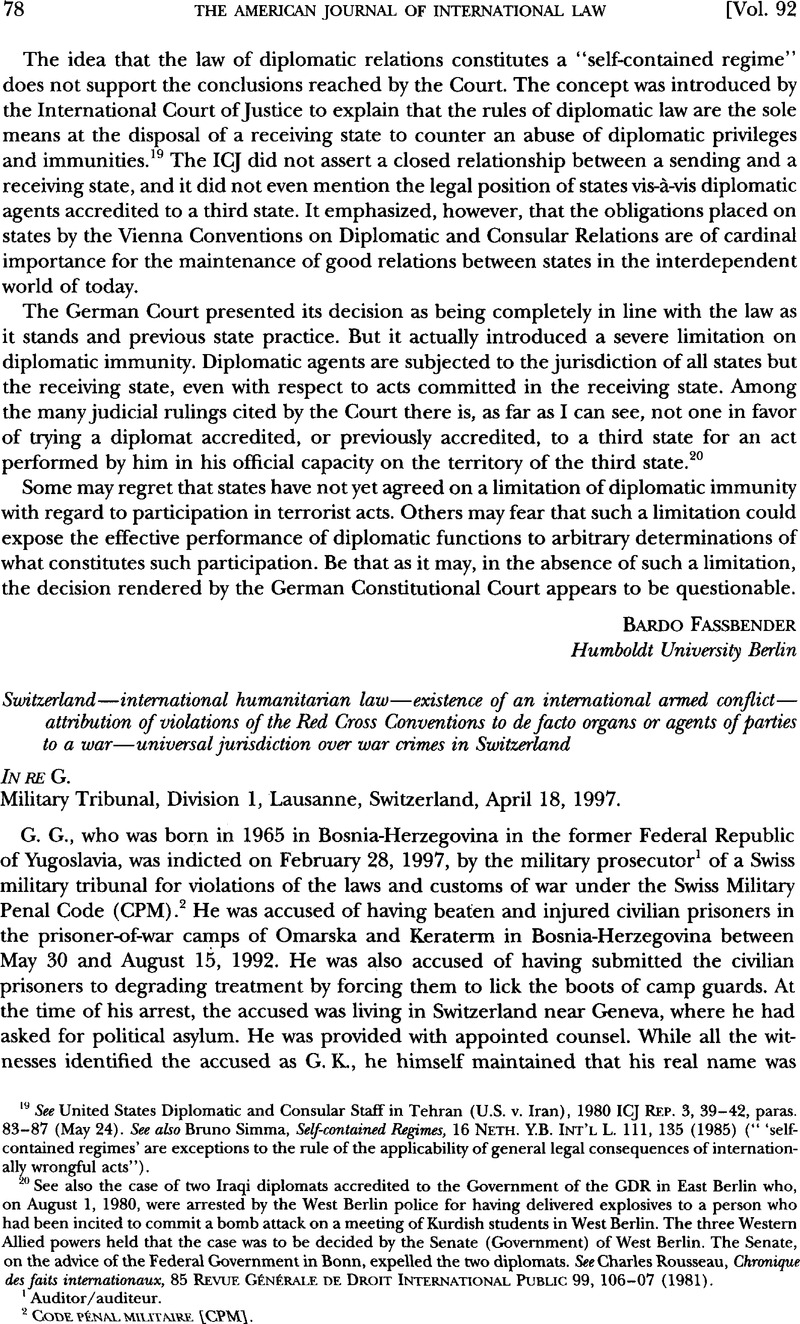Published online by Cambridge University Press: 27 February 2017

1 Auditor/auditeur.
2 Code Pénal Militaire [CPM].
3 Aug. 12, 1949, 6 UST 3316, 75 UNTS 135, Arts. 3(1)(a) & (c), 13, 14, 129, 130.
4 Aug. 12, 1949, 6 UST 3516, 75 UNTS 287, Arts. 3(1)(a) & (c), 16, 27, 31, 32, 146, 147.
5 Opened for signature Dec. 12, 1977, 1125 UNTS 3, Arts. 10, 11, 75, 76, 77, 85.
6 Opened for signature Dec. 12, 1977, 1125 UNTS 609, Arts. 4, 5, 13.
7 CPM Article 109 is the core provision with regard to war crimes and breaches of international law. It states under the tide Violations of the Laws of War (Violations des lois de la guerre):
(1) Whoever acts contrary to the provisions of any international agreement governing the laws of war or the protection of persons and property, or whoever acts in violation of any other recognized law or custom of war shall be punished with imprisonment except in cases where other provisions involving more severe sanctions are applicable.
(2) For offenses of high gravity the penalty is penal servitude.
For offenses of little gravity the punishment can consist of a disciplinary sanction.
Translation by author.
8 For details, see Article 108 in Kurt Hauri, Militärstrafgesetz—Kommentar (1983).
9 “Dans le cadre de ce conflit global, divers conflits armés internes ont éclaté, dont le conflit entre Bosniaques, l’armée des Serbes de Bosnie exécutant l’objectif de la République Fédérate de Yougoslavie de créer un nouvel Etat yougoslave à partir des régions de la Croatie et de la Bosnie-Herzégovie.” Judgment of Apr. 18, 1997, slip op. at 4 [hereinafter Judgment].
10 Id.
11 Id. at 4–6.
12 “Le tribunal est d’avis que le conflit dans l’ex-Yougoslavie doit être approché de manière globale et qualifié de conflit international.” Id. at 9.
13 Id. at 10.
14 CPM Art. 117, sees. 3(a) & (b), Art. 151, sec. 5.
15 CPM Art. 2, sec. 9, Arts. 108–14.
16 See, e.g., Rüdiger, Wolfram, The Decentralized Prosecution of International Offenses through National Courts , in War Crimes in International Law 124 (Yoram, Dinstein & Mala, Tabory eds., 1996)Google Scholar; Rafaëlle, Maison, Les Premiers Cos d’application des dispositions pénales des Conventions de Genève par les juridictions internes , 6 Eur. J. Int’l L. 260 (1995)Google Scholar.
17 CPM Article 109 would have been applicable in conjunction with Article 108, section 2 and Article 2, section 9 with respect to violations of Article 3(1) (a) & (c) of the Geneva Conventions Relative to the Treatment of Prisoners of War, supra note 3, and to the Protection of Civilian Persons in Time of War, supra note 4, as well as of Articles 4, 5 and 13 of Additional Protocol II, supra note 6.
18 CPM Article 108 strictly applies this distinction as made in the Geneva Conventions and the Additional Protocols.
19 Prosecutor v. Tadić, No. IT–94–1-T (May 7, 1997), summarized in 97 AJIL 718 (1997).
20 SC Res. 752 (May 15, 1992), 31 ILM 1451 (1992).
21 See supra note 9; and Judgment at 4, 2d para.
22 The nationality of the individuals concerned is not by itself decisive for the attribution of violations of international humanitarian law to one party or another. See International Committee of the Red Cross, Geneva Convention Relative to the Protection of Civilian Persons in Time of War: Commentary 47 (Oscar M. Uhler ed., 1958).
23 For the majority’s discussion of this matter in the Tadić case, see No. IT–94–1-T, para. 595 (May 7, 1997).
24 Id., Separate and Dissenting Opinion of Judge McDonald Regarding the Applicability of Article 2 of the Statute.
25 One notes, in this regard, the inquisitorial role of the judge in many civil law systems. See, e.g., Stephan, Trechsel, Law of Criminal Procedure , in Introduction to Swiss Law 241, 253 (Francois, Dessemontet & Tugrul, Ansay eds., 2d rev. ed. 1995)Google Scholar.
26 On this issue, see Jurg van, Wijnkoop, Zur Verfolgung mutmasslicher Kriegsverbrecher in der Schweiz , 47 Auszüge aus der Revue Internationale de la Croix-Rouge 237 (1996)Google Scholar.